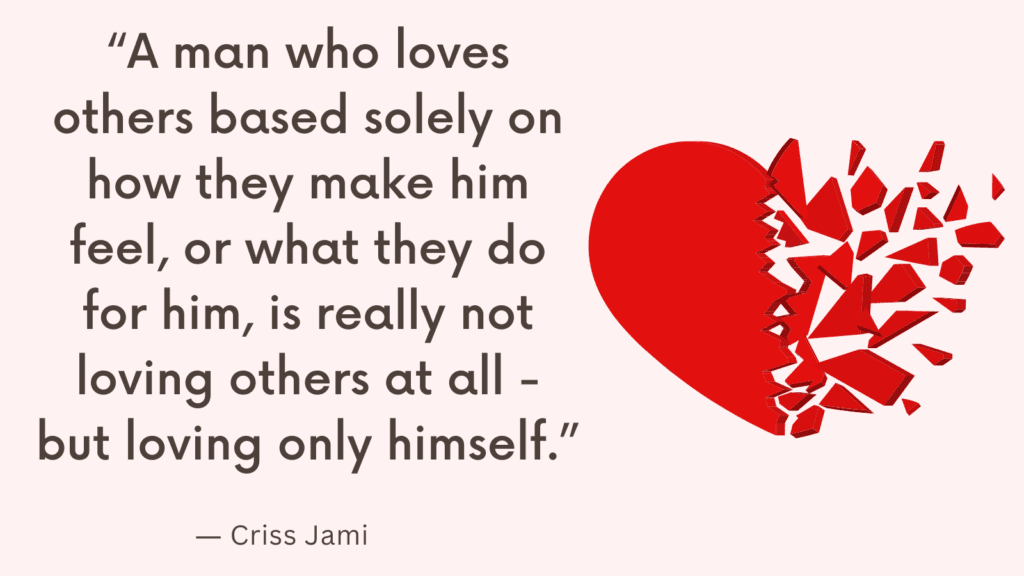In this post, you’ll find out the answer to the question: do narcissists feel guilt?
Who Is The Narcissist?
A narcissist is a person who has an excessive sense of self-importance, a deep need for admiration and attention, and often lacks empathy for others.
They may have an exaggerated view of their own abilities and accomplishments and tend to believe they are entitled to special treatment.
Narcissists can be manipulative and exploitative in their relationships and may struggle with maintaining healthy connections with others.
Related: How To Get Revenge On A Narcissist? (In Relationships & At Work)
Narcissism vs. Narcissistic Personality Disorder As Defined By The DSM-5-TR
Narcissism is a personality trait that can exist in various degrees in an individual and is not necessarily a pathological condition.
Narcissistic Personality Disorder (NPD), on the other hand, is a mental health condition characterized by a pervasive pattern of grandiosity, need for admiration, and lack of empathy.
It is a personality disorder listed in the Diagnostic and Statistical Manual of Mental Disorders (DSM-5) and can cause significant impairment in social, occupational, or other areas of functioning.
The DSM-5 criteria for NPD include:
1. Having a grandiose sense of self-importance
2. Fantasizing about unlimited power, success, brilliance, or beauty
3. Believing they are special and unique
4. Requiring excessive admiration
5. Having a sense of entitlement
6. Exploiting others to achieve their own needs
7. Lacking empathy for others
8. Being envious of others or believing others are envious of them
9. Demonstrating arrogant or haughty behaviors or attitudes
While someone may exhibit narcissistic traits, this does not necessarily mean they have NPD.
A diagnosis of NPD requires a comprehensive assessment by a qualified mental health professional.
Related: Top 10 Narcissistic Relationship Patterns
Understanding Guilt
Guilt is an emotion that arises from feeling responsible for something that has gone wrong or for something bad that has happened.
It can be a difficult and uncomfortable emotion to experience, especially if we believe that we have made a mistake or caused harm.
At its core, guilt is often related to our sense of morality, values, and beliefs about what is right and wrong.
It can also be influenced by external factors, such as societal norms and expectations.
Guilt can serve a positive purpose, as it can motivate us to make amends, take responsibility for our actions, and work towards making things right.
Related: 8 Stages Of Healing After Narcissistic Abuse (+FREE Breakup Recovery Worksheets)
Do Narcissists Feel Guilt or Remorse?
Narcissists commonly lack empathy and have a limited ability to feel guilt or remorse for their actions.
They often prioritize their own needs, desires, and interests over those of others, which can lead them to take advantage of people without feeling any sense of wrongdoing.
Additionally, they may rationalize their behavior and shift the blame onto others to avoid feeling guilty.
However, it is important to note that not all individuals with narcissistic traits exhibit the same behaviors, and some may occasionally experience feelings of guilt, though it is typically not consistent or long-lasting.
Related: Top 5 Reasons Why Narcissists Target Empaths – & How to Starve The Narcissist of Supply
Do Narcissists Feel Regret?
Narcissists typically have difficulty feeling regret for their actions and may not acknowledge or take responsibility for the harm they cause others.
Instead, they may blame others for the consequences of their actions, minimize their impact, or justify why their actions were necessary.
However, it is important to note that narcissism exists on a spectrum, and individuals with narcissistic tendencies may be capable of feeling regret and taking responsibility for their actions.
Related: When A Narcissist Sees You Cry: Top 13 Reactions You May Be Familiar With
Why Do Narcissists Avoid Taking Responsibility For Their Own Behavior?
Narcissists have a deep-seated need to maintain a positive self-image and protect their fragile ego.
They have a distorted sense of self-importance and entitlement, and they believe that they are always right, and everyone else is wrong.
As a result, they may blame others for their mistakes or shortcomings, make excuses for their actions, engage in gaslighting or deny any wrongdoing altogether.
Narcissists also lack empathy and the ability to consider other people’s perspectives.
Therefore, they may not recognize or acknowledge how their behavior has affected others.
They may view themselves as superior and untouchable, so admitting fault would threaten their sense of power and control.
Furthermore, narcissists often have a fear of abandonment or rejection.
They may worry that admitting fault will make them appear weak or flawed, leading others to reject or abandon them.
Hence, they avoid taking responsibility to protect their fragile self-esteem and maintain their illusion of superiority.
Related: Do Narcissists Cry?
How Does A Narcissist Apologize?
A narcissist’s apology may be insincere and lack empathy.
They may apologize in order to manipulate the situation or gain personal benefits.
Their apology may also contain excuses and shifting of blame onto others.
Overall, a narcissist’s apology may not be genuine and may revolve around their own needs rather than the feelings of the person they are apologizing to.
Related: 5 Weird Things Covert Narcissists Do To Manipulate Their Victims
Conclusion
Narcissists have a limited ability to feel guilt, remorse, empathy, or sympathy for others.
They are primarily focused on their own needs and desires, and tend to lack emotional connection with others.
While some narcissists may express regret or apologize when it serves their self-interest, it is often done to manipulate others rather than out of genuine remorse.
However, it’s important to note that not all individuals with narcissistic traits or disorder are the same and may differ in their capacity for remorse.



